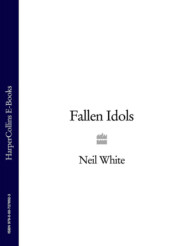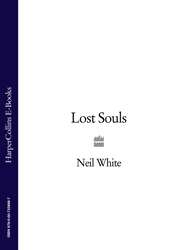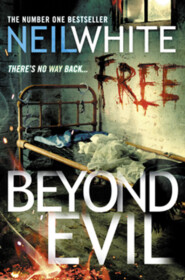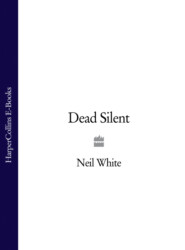По всем вопросам обращайтесь на: info@litportal.ru
(©) 2003-2024.
✖
Neil White 3 Book Bundle
Автор
Год написания книги
2018
Настройки чтения
Размер шрифта
Высота строк
Поля
He went outside to set the traps and then he filled a barrow with empty booze bottles and wheeled them towards the house. When he got inside, he saw that the Elams were already nailing the barbed wire to the windows, following Gemma’s lead, creating a spider’s web across each one, nailing the wire half in and then bending the nail over. Peter wasn’t doing much good. He wasn’t the sort who was used to physical work, and so he bent more nails than he pushed in, but it was the effort he was putting in that John admired.
Jennifer looked back and grinned. ‘This will keep them out.’
‘I hope so, I really do,’ John said, ‘but leave a space in the middle of each one. We’re going to make petrol bombs. If they get the grilles off, we can fight back with those.’
Jennifer’s eyes widened at that. She liked the thought.
John pointed to the wheelbarrow by the door and addressed the other young women that were left. ‘Fill those from the fuel tank. Dip a rag in the petrol, get it soaked, and then jam the cloth hard into the neck. I want ten under each window. We’ll work out how to make a catapult, so we can use them when they are further away.’
As the women scurried off, John went to the cabinet where the old man kept his shotguns. There were three of them, and a box of cartridges. The last firearms licence was a few years old now, due for renewal. John guessed that he wouldn’t be applying for another.
The cabinet was in the hallway next to the old man’s room. As he pulled out one of the shotguns, there was a moan from the room.
John pushed open the door, one of the few rooms that had one, the shotgun still in his hand. Henry wanted to keep the old man locked away. As the door creaked open, the old man looked at him. His eyes were yellow, his skin pale grey. He tried to make sounds, but all that came out were strangled moans. His head lifted as if he was making an effort to get up, but he just flopped back onto the bed, his head turned to one side.
Dawn brushed past him, pushing John into the doorframe. ‘I’m going to feed him, and change him,’ she said, her eyes fierce. ‘Don’t think about stopping me. Henry hasn’t said that we shouldn’t.’
John didn’t say anything. Instead he just watched as Dawn went to him and lifted a cup to his lips. He drank gratefully, even though he couldn’t lift his arm to grip the cup. As the sheet fell away, John saw the ribs jutting through the skin, through the soiled vest, his shoulders sharp and bony.
‘Get some bread,’ Dawn said. ‘And heat some soup. He’s starving to death.’
The old man shook his head, not much more than a tremor, and then looked towards the gun. He nodded, almost invisibly, his mouth hanging open, his eyes yearning, but John saw it all the same. He was straining towards the gun before he flopped back onto the bed, his chest rising up quickly, his lungs working like pistons, his breaths coming out as loud rasps.
‘He wants me to kill him,’ John said quietly, looking down at the shotgun in his hand.
Dawn shook her head. ‘No, that is not what we are about, you know that, John. Come on, get some soup. He’s dying.’
There was a click next to him, the snap of metal, and Gemma appeared in the doorway alongside him. She was holding one of the other shotguns.
‘Henry hasn’t told us to feed him.’ Gemma raised the shotgun. ‘So are you going to go against him? Are you going to be the one who betrays us?’
Dawn’s eyes flashed between the shotgun and the old man, then to John, looking around the room, pleading, scared. ‘We can’t do this,’ she said, her voice cracking. ‘It’s inhumane.’
‘Come out,’ Gemma said, her voice lacking in tone, flat and emotionless, and she twitched the shotgun.
Dawn put the cup down and walked towards the doorway, her shoulders slumped. When she went past John, she looked up at him, stared into his eyes, and he read what she was thinking, that it was all wrong.
John looked towards the old man, and doubts surfaced, because he looked close to death, emaciated and bedridden, and John knew it was cruel.
Gemma spoke up. ‘John, help me.’
When he glanced back towards her, he felt his doubts slip away.
John turned round to push Dawn on her shoulder, so that she stumbled towards the bottles now piled in one corner.
‘Sit there, don’t move,’ he said, and then he walked towards the door that opened onto the field.
Someone had to keep watch.
Chapter Thirty-Three
As Charlie looked at the contents of the Billy Privett file spread across the table, Donia asked, ‘So what is the story? The real story?’
‘You’ve heard of Billy Privett?’
She nodded. ‘Everyone’s heard of Billy Privett. That’s why I came to Oulton.’
Charlie was surprised. ‘What, because of Billy?’
‘Not exactly,’ she said, smiling, knowing how it sounded. ‘I knew which firm represented him, and so I guessed that you were important.’
‘And now, you’re disappointed?’
‘I didn’t expect you to be how you are,’ she said.
‘What, some small practice above a takeaway?’
‘Something like that,’ she said, embarrassed.
‘You don’t need fancy offices if you do criminal work,’ Charlie said. ‘Just somewhere convenient for the clients and not too far from the court.’
‘So about Billy?’
Charlie sighed. ‘He was just a loser who got lucky once in his life,’ he said, waving his hand dismissively. ‘Six numbers, that’s what changed him. He was a pain in the arse before he won it. Afterwards, he was a pain in the arse who suddenly thought he was a big deal.’
‘But was he a murderer?’ Donia said. ‘Did he kill Alice Kenyon?’
Charlie shrugged. ‘He said not. Perhaps there’ll be something in here,’ and he patted the papers on the desk. ‘I know that Amelia fought hard to keep him away from the inquest.’
‘Could he do that? Stay away, I mean.’
‘Inquests are just to find out how someone died. They’re not there to find the murderer. It’s the how and the why, not the who. Billy provided a written statement that said he didn’t remember anything, even who else was there. The coroner decided that there was no point in making him give evidence at the inquest if that was all he was going to say. Ted made a real stink in the papers about that, but he just wanted the inquest to be something different to what it was.’
‘I feel sorry for him,’ Donia said. ‘I’ve seen him on the news. He seems like a nice man.’
‘He is, much nicer than me, but he’ll go to the grave waiting to find out what happened, now that Billy is dead.’
Charlie reached for the correspondence clip and went to the back, to the first time Amelia had spoken to Billy, when the police had dragged him in after Alice had been found. Most of the information was just personal, just what they would need to conduct the case. There was a sheet at the back where she had written out Billy’s version of events. When he looked, Charlie was surprised. He had expected to read Billy’s story, all set out in Amelia’s neat script, but there was just one sentence. I do not wish to disclose to anyone what happened at my house on 14th May 2011, with his signature underneath.
He tapped his lip. That was unusual. Billy Privett didn’t even want Amelia to know what had happened. That isn’t how clients work. They try to get their lawyer to believe the lies, as if it somehow makes it true when it becomes the official version. They never realise that the lawyer never truly believes, or even cares. It is only ever about two things; what can be proven, and how will they get paid.
‘What did Billy say?’ Donia asked, leaning forward.
‘Not much,’ Charlie said, and showed her the piece of paper.
She frowned and sat back. ‘So the file isn’t important.’
He started to flick through the other sheets of paper, with letters sent to Billy demanding that her bills be paid. Once the police station work had finished, Amelia billed Billy privately for her work. As he got to the end, to the letter sent most recently, he opened his mouth to speak, but couldn’t think of what to say.











